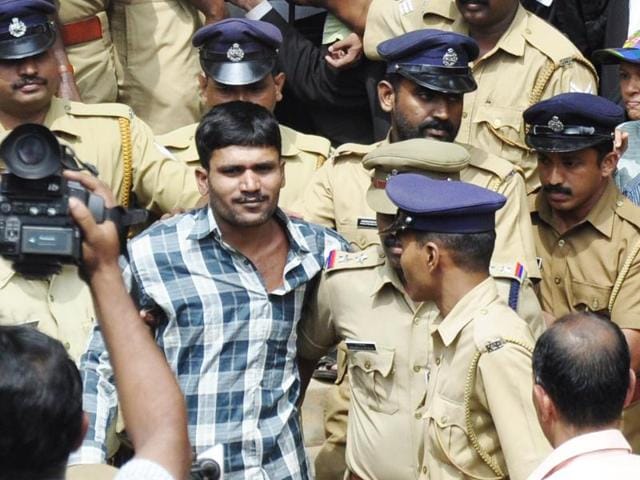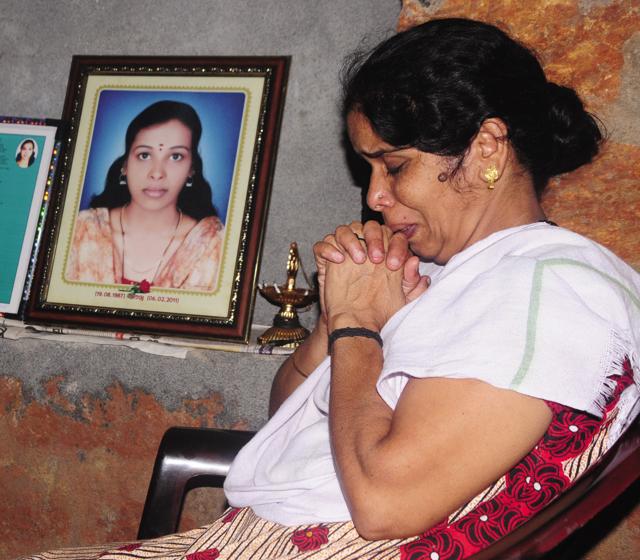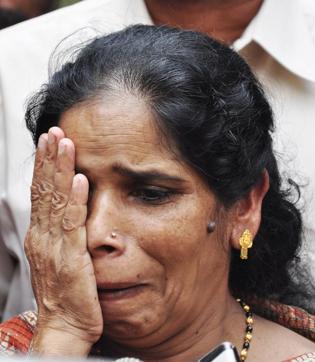SC verdict on Soumya rape-murder case not ‘punishment enough’ for the crime?
The Supreme Court had commuted the death sentence of Govindachamy, a convict in the brutal rape and murder case of 23-year-old Soumya, to a seven-year jail term.
Kerala was busy celebrating Onam when the Supreme Court pronounced its verdict on the infamous Soumya murder case on September 15, 2016, the day after Thiru Onam - the most important day of the festival. But the judgement, when it arrived, dampened the state’s festive spirit as the prosecution failed to produce clinching evidence to prove that Govindachamy, the accused, had intended to kill Soumya, following which the apex court commuted his death sentence to life imprisonment.

Soon after the verdict was out, television channels and other media outlets went to town erroneously reporting that the 30-year-old Govindachamy, who is lodged at the Central Prison in Kannur, would walk free after spending 16 more months in prison. The media whipped up public ire and put the government under tremendous pressure. The reports eventually turned out to be false, as the verdict turned out to state that the convict would continue in prison for life.
Even so, the Kerala government found itself in the dock as the three-judge bench, headed by justice Ranjan Gogoi, said the prosecution failed to produce reliable evidence to show that the accused had pushed Soumya off the train.
Going into the Supreme Court, the prosecution clearly had the upper hand, as a trial court had found Govindachamy guilty of murder, which was subsequently upheld by the Kerala high court. However, the prosecution’s failure to convince the apex court raised doubts about the Kerala government’s commitment to a case that shook the conscience of the state.
It was on February 1, 2011, that Govindachamy, a one-armed habitual offender from Virudhachalam in Cuddalore, allegedly threw Soumya off a moving train and raped her in the woods near the railway track at Vallathol Nagar railway station. She succumbed to her injuries while undergoing treatment at the Government Medical College in Thrissur on February, 6, 2011.
Soumya, a native of Shornur in Palakkad district, was working as a supermarket assistant in Ernakulam. According to the FIR registered at Cheruthuruthy police station, the 23-year-old looked quite happy when she boarded the Ernakulam-Shornur passenger train on February 1, as she was headed for her engagement the next day.
The prosecution’s statement said that on February 1, the accused noticed that Soumya was alone in the ladies’ compartment. As soon as the train left the Vallathol Nagar railway station, they alleged that Govindachamy assaulted her and repeatedly slammed her head against the walls of the compartment before throwing her out of the train. He too jumped out of the slow moving train and found Soumya lying near the railway tracks. He carried her to the nearby woods and raped her. He was arrested from Palakkad railway station the next day.
On October 31, 2011, a fast track court in Thrissur found Govindachamy guilty under sections 376 (rape), 302 (murder), 394 read with 397 (dacoity, causing injury during robbery) and 447 (criminal trespass) under the Indian Penal Code and handed him the death sentence. Judge Raveendra Babu pointed out that Govindachamy had committed the offences in a “diabolic manner” and did not deserve any leniency.

A division bench of the Kerala high court approved the lower court verdict two years later in December 2013, while rejecting the convict’s appeal. The division bench of Justice TR Ramachandran Nair and Justice B Kemal Pasha observed that case was among the “rarest of rare” ones, and said that “all evidences showed that the rape, murder and robbery were committed” by the accused.
What went wrong?
One argument is that the appointment of a new team based on political considerations weakened the prosecution that failed to establish the accused’s intention to kill Soumya. The Supreme Court bench was unconvinced that Govindachamy had pushed Soumya out of the train, which led to one of two injuries thought to have caused her death.
More lapses came to light when the forensic expert who conducted Soumya’s autopsy revealed that the new prosecution didn’t approach her before arguing the case in the Supreme Court. “My report elaborated all injuries found on Soumya’s body. I had also testified in the trial court for four days to clear the Court’s doubts. The high court took the post-mortem report as crucial evidence. However, the prosecution in the Supreme Court ignored me,” Dr Sherley Vasu, who conducted the autopsy on Soumya and is the head of the forensics department at the Government Medical College, Thrissur, told media persons in Thrissur a day after the verdict.
The Kerala government is struggling to explain why former special prosecutor, advocate A Suresan, who fought the case in the lower court and high court, was not appointed for the SC task. Suresan said the government didn’t issue any orders appointing him as a prosecutor or advisor to the standing counsel when
the case came up in the Supreme Court. “The government asked me to help the standing counsel. I requested it to notify the scope of my work. But the government ignored my request. It also didn’t ask the standing counsel to discuss the case with me,” he said.
He revealed that the standing counsel rang him up only after the Supreme Court asked for evidence of murder. “The government should have sent someone who has thorough knowledge about the incident,” he told reporters in Thrissur after the verdict.
Soumya’s mother, G Sumathi, also blamed the government for not appointing Suresan as special prosecutor. “I was not aware of the government’s decision to change the prosecutor who presented the case in lower courts,” she told reporters.
According to advocate general P Sudhakara Prasad, the standing counsel in the Supreme Court, Nishe Rajan Shonker, had indeed requested the services of former prosecutor A Suresan. “But Suresan had informed the standing counsel of his unavailability owing to his duty as a managing committee member of the Guruvayoor temple Committee,” Prasad told reporters in Kochi on Friday.
Meanwhile, T Asaf Ali, former Kerala director general of prosecution, claimed that the Supreme Court Bench erred in analysing the evidence. “The prosecution had framed serious offences, including murder and rape against Govindachamy with scientific evidences. That is why the trial court and the high court gave maximum punishment to the culprit,” he told this reporter.
“It was scientifically established that Govindachamy had pulled Soumya down from the moving train. She fell a few metres away from the track, which proved that someone threw her off the moving train. We even had witness accounts that Govindachamy behaved violently inside the train,” he said. “The prosecution claimed to have provided satisfactory answers to the questions, so it must be inferred that the Supreme Court erred in analysing the evidences.” However, he later wrote in an opinion piece in Madhyamam that he also believed the government didn’t take the case seriously enough. “Previous Congress-led UDF government had appointed eminent criminal lawyer Thomas P Joseph for the prosecution. Our panel had state standing counsel Joji Scaria and the prosecution lawyer who appeared in the trial court. However, with the change of guard in state, the CPI(M)-led LDF government had appointed a junior advocate as Standing Counsel and omitted the prosecutor from the case. That is why I said the government didn’t take the case seriously. If the government had retained the services of experienced advocates in the panel, the verdict would have been different,” he wrote.

Former Kerala chief minister Oommen Chandy believes that the Supreme Court’s verdict shows a lapse on the part of the LDF government. “The services of the probe team and advocates, who appeared in lower court and high court for the same case, were not used properly by the present prosecutor. That was the reason for the failure,” Chandy reportedly said.
Even as the discussions on implications of the Supreme Court verdict continue, some judicial experts believe that the top court should have held Govindachamy for murder. “What the court has overlooked is that Section 300 of the IPC, which defines murder, has four parts and only the first part requires intention to kill. If any of the other three parts are established, it will be murder even if there was no intention to kill. It was regrettable that the court has not read Section 300 carefully. The judgement needs to be reviewed in an open court hearing,” opined former Supreme Court judge Markandey Katju in a post on Facebook. In another post, he also criticised the SC’s admission of hearsay as evidence, saying, “Even a student of law in a law college knows this elementary principle that hearsay evidence is inadmissible.”
Kaleeswaram Raj, a prominent lawyer in the Supreme Court and Kerala high court, felt that the verdict was “shockingly soft” and “highly dispiriting”. “With great respect, I may say that the punishment imposed by the Supreme Court is too meagre and has no deterrent effect. Also, it fails to satisfy the public consciousness. […] The court has rightly retained the maximum possible punishment of life imprisonment on the accused who is a potential threat to the society. But the court could have done more than that. There were also other punishable offences which were not properly dealt with. Those included extortion, assault etc, which deserved separate jail terms,” he wrote in the media.
The court proceedings have also put Mumbai criminal lawyer Biju Antony Aloor, aka BA Aloor, in the limelight. Aloor, who has appeared in a string of high-profile cases, has reportedly said that he had earned over Rs 15 lakh appearing for Govindachamy, raising several questions about how a petty thief described as a “beggar” could afford such an expensive lawyer. “Some of my previous clients had requested me to take up this case. It is the duty of an advocate to appear from lower court to higher court without fail if he takes up the case. I won’t work for free,” Aloor told reporters.
Aloor said he felt satisfied after his client’s death sentence was commuted and agreed that the prosecution could have done better. “The police and the prosecution should be blamed for the verdict. The court would have believed the prosecutions’ arguments had it presented proper evidence and avoided presenting duplicate documents,” he told the media.
What next?
Now struggling to douse public ire, the Kerala government has begun a fire fighting operation. Chief minister Pinarayi Vijayan has himself termed the judgement unacceptable and a concern for those who value human life. “The judgement disproved evidences considered by the lower courts. This is not a punishment enough for the crime,” he said in a statement.
Sumathi wept inconsolably after hearing the verdict. “My daughter didn’t get justice but I will fight till the end of my life to secure it,” she told reporters.
Meanwhile, Kerala law minster AK Balan has vowed to ensure that Soumya’s killer gets the death penalty. The minister also informed the media that the state government will file a review petition soon. “It will give us an opportunity to correct the flaws in the submitted documents. Attorney general Mukul Rohatgi will appear for the state government and request an open court hearing,” he said.
Published in arrangement with GRIST Media
Get Current Updates on India News, Lok Sabha Election 2024 live, Infosys Q4 Results Live, Elections 2024, Election 2024 Date along with Latest News and Top Headlines from India and around the world.



